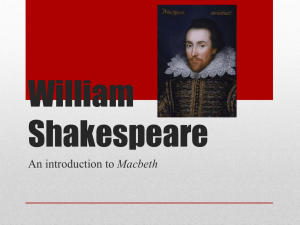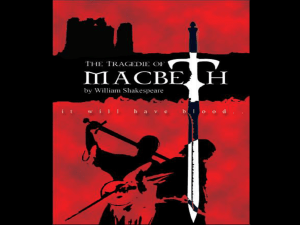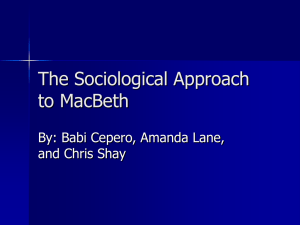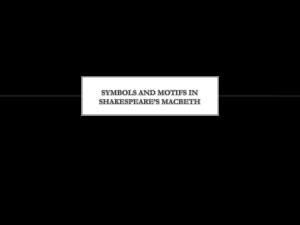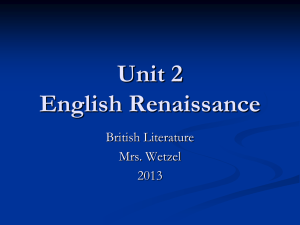The Curse of Macbeth
advertisement
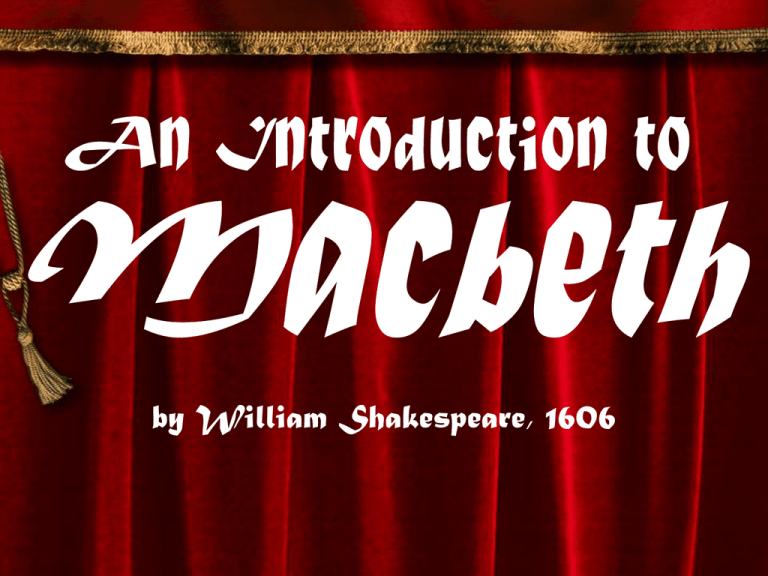
by William Shakespeare, 1606 Macbeth in a Nutshell Setting: Scotland Source: Holinshed’s Chronicles of England, Scotland, and Ireland Best Known For: It’s supernatural creepiness Major Characters: Macbeth: A general in the king of Scotland’s army Lady Macbeth: His wife Three Witches King Duncan of Scotland Macduff: A Scottish Nobleman One-Sentence Plot Encapsulation: Lady Macbeth encourages her husband to be more aggressive in pursuing career options. Moral: What goes around comes around. Best Feature: Witches. Worst Feature: Theater people believe Macbeth to be cursed and will only refer to it as “the Scottish play.” The “Real” Macbeth • 11th century Scottish king • Had a legitimate claim to King Duncan’s throne • Was supported by other nobles who were dissatisfied with King Duncan • Ruled successfully for many years • King James was a Scot and claimed to be a direct descendant of Banquo (Banquo’s son, Malcolm Canmore reigned as Malcolm III for 35 years founder of the house of Stuart). The Curse of Macbeth Is there an evil spell on this ill-starred play? From Dina Tritsch, Showbill, April 1984 King James I In 1604 Shakespeare reproduced a 17th century black-magic ritual for the opening scene of Macbeth’s Act IV in order to please King James I (an authority on demonology). The Art of Spell Casting "Round around the cauldron go; In the poison'd entrails throw. Toad, that under cold stone Days and nights has thirty-one Swelter'd venum sleeping got. Boil thou first i' the charmed pot" The Curse Witches, unhappy with Shakespeare’s negligent exposure of their craft, cast an everlasting spell on the play as punishment. 1606: Actor Dies Shakespeare is forced to play the role of Lady Macbeth when the original actor died. King James I was so displeased that he banned the play for five years. 1672: Murder occurs on stage In Amsterdam, the actor playing Macbeth substituted a real dagger for the blunted stage dagger and killed Duncan in full view of the audience. Lady Macbeth: Lady of UNluck As Lady Macbeth, Sarah Siddons was nearly ravaged by a disapproving audience in 1775; Sybil Thorndike was almost strangled by a burly actor in 1926; Diana Wynyard sleepwalked off the rostrum in 1948, falling down 15 feet. 1849: Astor Place Riot During its 1849 performance at New York's Astor Place, a riot broke out in which 31 people were trampled to death. 1937: Man in Audience Suffers Heart Attack In 1937, when Laurence Olivier took on the role of Macbeth, a 25 pound stage weight crashed within an inch of him, and his sword which broke onstage flew into the audience and hit a man who later suffered a heart attack. 1934: Actor and Replacement Get Sick In 1934, British actor Malcolm Keen turned mute onstage, and his replacement, Alister Sim, like Hal Berridge before him, developed a high fever and had to be hospitalized. 1942: 5 Die In the 1942 Macbeth production headed by John Gielgud, three actors -- Duncan and two witches -- died, and the costume and set designer committed suicide amidst his devilish Macbeth creations. 1953: “…. pants on fire.” The indestructible Charlton Heston, in an outdoor production in Bermuda in 1953, suffered severe burns in his groin and leg area from tights that were accidentally soaked in kerosene. 1970-now: The Curse Continues An actor's strike felled Rip Torn's 1970 production in New York City Two fires and seven robberies plagued the 1971 version starring David Leary In the 1981 production at Lincoln Center, J. Kenneth Campbell, who played Macduff, was mugged soon after the play's opening. Of course, no explanations have been given for the seemingly inevitable toil and trouble that is part and parcel of this unlucky play. You don't, in fact, ever refer to Macbeth or quote from it unless rehearsing or performing it. You also don't, as explained to me by countless brave and talented actors from Glenda Jackson to Ian McKellen, refer to this haunted play by name, but instead you call it That Scottish Play or simply That Play; everyone, it seems, will get the message, in a flash.



